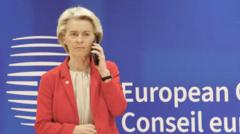The EU's General Court has ruled that the European Commission's refusal to disclose messages between Ursula von der Leyen and Pfizer CEO Albert Bourla during COVID vaccine negotiations was unjustified, raising concerns about transparency.
European Court Ruling Demands Transparency in EU Vaccine Negotiations

European Court Ruling Demands Transparency in EU Vaccine Negotiations
EU court says Commission wrong to deny release of von der Leyen's texts to Pfizer chief during COVID vaccine talks.
The European Commission has been ordered by the EU's General Court to release text messages exchanged between its President Ursula von der Leyen and Pfizer CEO Albert Bourla during key negotiations for COVID-19 vaccines. The court found that the Commission failed to provide a convincing rationale for why these communications should remain private when requested by an investigative journalist back in 2021.
This case, referred to as "Pfizergate" in Brussels, emerged after Pfizer established lucrative vaccine contracts worth billions of euros with the EU, including a significant deal for an additional 1.8 billion doses. The ruling could pose a reputational threat to von der Leyen, who has been a central figure in the EU's pandemic response since her appointment in 2019 and secured a second term late last year.
Transparency International welcomed the decision, calling it a pivotal win for transparency within the EU and calling for an end to restrictive practices regarding freedom of information.
The controversy gained traction following an April 2021 report by New York Times journalist Matina Stevis, detailing how von der Leyen conducted private negotiations with Bourla once regulatory approval was granted for the Pfizer-BioNTech vaccine. This sparked journalist Alexander Fanta to file a Freedom of Information request for the messages from January 2021 to May 2022, only to be denied by the Commission, which claimed not to possess the records.
Despite rules requiring all documents to be archived, mobile text messages occupied a grey area, not clearly classified as public records. An inquiry by the European Ombudsman discovered maladministration as the Commission did not search effectively for the requested messages.
Stevis and the New York Times then initiated legal action, and the court ruled that the Commission had relied on assumptions and unclear information. The court emphasized that it is the Commission's responsibility to demonstrate the absence of the documents if they do not exist, while failing to confirm whether the text messages had been deleted or not.
This case, referred to as "Pfizergate" in Brussels, emerged after Pfizer established lucrative vaccine contracts worth billions of euros with the EU, including a significant deal for an additional 1.8 billion doses. The ruling could pose a reputational threat to von der Leyen, who has been a central figure in the EU's pandemic response since her appointment in 2019 and secured a second term late last year.
Transparency International welcomed the decision, calling it a pivotal win for transparency within the EU and calling for an end to restrictive practices regarding freedom of information.
The controversy gained traction following an April 2021 report by New York Times journalist Matina Stevis, detailing how von der Leyen conducted private negotiations with Bourla once regulatory approval was granted for the Pfizer-BioNTech vaccine. This sparked journalist Alexander Fanta to file a Freedom of Information request for the messages from January 2021 to May 2022, only to be denied by the Commission, which claimed not to possess the records.
Despite rules requiring all documents to be archived, mobile text messages occupied a grey area, not clearly classified as public records. An inquiry by the European Ombudsman discovered maladministration as the Commission did not search effectively for the requested messages.
Stevis and the New York Times then initiated legal action, and the court ruled that the Commission had relied on assumptions and unclear information. The court emphasized that it is the Commission's responsibility to demonstrate the absence of the documents if they do not exist, while failing to confirm whether the text messages had been deleted or not.





















